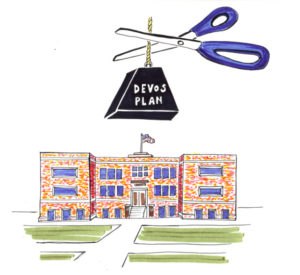The staff editorial is the majority opinion of The Murray State News Editorial Board

When president Trump was on his fiery campaign trail, he made it clear he would surround himself with people who would help him fulfill his campaign slogan: Change.
Scratch that – Make America Great Again, or “Change” with a makeover.
Well, since his inauguration, his promises have unfortunately come true. The new president has not wasted any time in hand-picking some strange Trumpites, including doomsday prepper Steve Bannon and the queen of education, Betsy DeVos.
DeVos, who was appointed Secretary of Education Feb. 7, is about as qualified to make decisions about the public school system as our president is to be commander in chief. We know many Americans admire Trump for his lack of experience as a politician and believe it will enable him to do the job more effectively than previous presidents, but do those supporters feel the same way when it comes to DeVos and her specific position?
DeVos faces much opposition for her stance on school choice and voucher programs, and rightly so. While giving children and parents more educational opportunities sounds like a great plan, it collapses when put into practice with taxpayer dollars. DeVos, if given free reign, would use public funds in order for children to attend private schools, which, because of the religious nature of many of those schools, would violate the separation of church and state.
In Murray, educators worry what effect her plan would have on the Calloway County public school system. Like many other small, rural towns, there is no room for choice – there is only the few small public schools which cannot afford to lose federal assistance.
Erica Gray, who teaches chemistry at Calloway County and has also taught in McCracken County, told staff writer Lindsey Coleman about the dangers of DeVos’s plan.
“When you start diverting public school dollars into private things, it creates an even greater performance and income inequality gap that is already an issue in a lot of those cities, so that’s a real concern,” she said.
A recent Washington Post article discussed how harmful DeVos’s agenda could be by analyzing how Chile’s school system – which heavily operated on voucher programs – suffered. In that community, children from lower-income families were less likely to attain vouchers and were consequently stuck in a public school faced with less and less funding. Meanwhile, private schools recruited students based on family status, income and the projected performance of the child and only educated those privileged groups.
Even if a small town like Murray had more school options, it’s easy to see how many students would get left behind and subject to underfunded, underdeveloped public systems because of their socioeconomic status.
Ultimately, it seems all politicans would argue they want the same thing: for the children in our country to be educated well and have as many opportunities as possible.
The path to acheive that, however, looks extremely different to the red and blue sides of our government.
No child should be forced to attend a school that doesn’t satisfy them, and if DeVos succeeds in implementing her agenda, there could be more students, not less, having to settle for subpar education because there is no alternative choice.




























































































